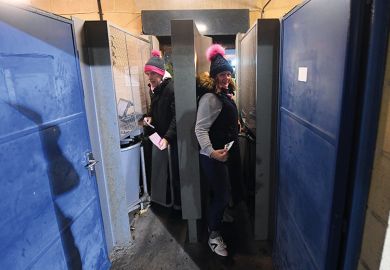The Harvard professor Steven Pinker has made a second career out of debunking pessimism about the state of the world.
Over the course of two books and countless interviews, he has assured those who feel in their bones that things are getting worse, that the objective evidence tells us otherwise. The data, he says, tell a very different story from the dispiriting collection of events we hear about in the news.
Whether the same is true in higher education in 2022 seems rather doubtful.
The start of national strike action across the UK this week is one indicator pointing firmly in the other direction; the findings of our recent work-life balance survey is another (44 per cent of the 1,200 respondents globally said they were planning to leave academia because of overwork).
And if we want the objectivity of data, then consider the analysis of Mark Corver, founder of dataHE, who assessed the situation facing universities in England at last week’s THE Campus Live event.
Having been frozen for years, and with inflation running wild, the domestic tuition fee in England now equates to about £6,500 at 2012 prices – a real-terms cut of about 30 per cent, he said.
With universities forced to control enrolment after wild swings during the pandemic, last year saw the first supply-led reduction in enrolments since the fee hike in 2012, and although some high-tariff institutions have been able to increase international enrolment (with uncapped fees), even here the inflation-adjusted figures suggest that non-European Union fees are largely flat in real terms.
Policy insiders such as Iain Mansfield, now of Policy Exchange, warn that there is no appetite in Westminster to increase domestic fees, and one vice-chancellor at last week’s event predicted that the best the sector could hope for was a cross-party commitment to review funding after the next general election.
Even if significant reform were to come from that, he predicted that “we are stuck with the current fixed-level fee until perhaps 2027”.
With a current retail price index above 14 per cent, and with Steve West, vice-chancellor of the University of the West of England and president of Universities UK, telling THE Campus Live that his university’s energy bill could triple from £6 million to £18 million next spring, that is an impossibly long wait.
All of which suggests that, whether you prefer data or what you see around you, this is a particularly difficult time to be leading a university: a conclusion borne out in many of the findings of our THE university leaders survey.
I asked one serving vice-chancellor with more than a decade in the job for his view, and he told me that the toughest challenge today was the pace and complexity of the issues.
Universities are far bigger than they used to be, bringing “more risk, more stuff that can go wrong”, while student expectations and the nature of student cohorts are also getting tougher to manage – including on measures such as neurodiversity, mental health and international cultural complexity.
All this requires university leadership teams who are “technically able at every level, but also leaders who are empathetic, and who understand the dynamics of human relationships”.
I also asked John Cater, who has led Edge Hill University for 30 years, how we had ended up here.
“The roots probably date back to the fiscal crisis of 2008-09, and the increased state intervention that heralded,” he said.
“The 2012 tuition fee change gave institutions headroom to invest, but [the government] felt outflanked as universities, entirely logically, migrated en masse towards the £9K fee – and I think that lack of trust has characterised relationships through to the present day.
“Crucially, regulating universities in the same way as one regulates the supply of water seems misconceived, and every call for less bureaucratic systems seems to engender the opposite.”
So far from following Pinker’s rule, it seems that things really are as tough as they appear to be.
But it is worth acknowledging that while university leadership requires a particular skill set and approach, higher education is far from unique in facing ever more complexity and challenge.
As Sir Lawrence Freedman, emeritus professor of war studies at King’s College London, reflects in a THE interview about his new book on military command, “my experience in university management added to my view of strategy. There is no point in acting like a military commander, people don’t jump to attention when you enter the room. You have to rely on persuasion.
“That said, the pressures are different from the military sphere: however much you get things wrong in universities, people don’t die.”
Register to continue
Why register?
- Registration is free and only takes a moment
- Once registered, you can read 3 articles a month
- Sign up for our newsletter
Subscribe
Or subscribe for unlimited access to:
- Unlimited access to news, views, insights & reviews
- Digital editions
- Digital access to THE’s university and college rankings analysis
Already registered or a current subscriber?








